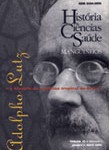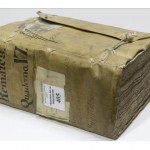May, 21th, 2021
Interview with Volker Roelcke | Vivian Mannheimer and Marcos Cueto

Physicians who were accused of having committed atrocities in the Nazi context: Hertha Oberheuser (standing), with most of the defendants on the bench, including the main defendant Professor Dr. Karl Brandt, at the Nuremberg Medical Trial, Germany, on Nov 25, 1946. Source: The Lancet
According to Volker Roelcke, professor of History of Medicine at Giessen University, medicine during the Nazi period is still surrounded by myths, such as that only a few fanatical physicians committed medical atrocities and that all other physicians and medical scientists were coerced by the Nazi regime.
Identify, describe, and analyze the historical evidence that refutes these assumptions, to spell out the implications for today, and to develop suitable formats for future teaching are the main objectives of the Lancet Commission on Medicine and the Holocaust, formed in January this year and co-hosted by Roelcke.
In an interview with our blog, Volker Roelcke talked about medicine during the Holocaust, the Lancet Commission, and the use of the term genocide, among other issues.
You co-chair the Lancet Commission on Medicine and the Holocaust: Historical Evidence, Implications for Today, Teaching for Tomorrow, formed in January of 2021.[1] Why is it important for physicians and health care professionals to reflect on the Holocaust today?
The Holocaust was a “rupture of civilization“ (Zivilisationsbruch), a rupture that contradicted anthropologically anticipated certainties, as the historian Dan Diner diagnosed.[2] It was a fundamental challenge and indeed subversion of the self-images, modes of thought, and value hierarchies of Western societies which are conventionally understood as enlightened and rational, as culturally, scientifically, and technically “developed”, and which – in this perspective – are usually perceived as a model for the future development of non-Western societies. The massive cooperation of physicians in the planning, implementation, and justification of breeding utopias, racism, selection procedures, warfare, and the systematic mass annihilation of human beings defined as “biologically inferior” or “unworthy of living” has been broadly documented by now.[3] Significantly, in the self-definition and governmental practices of the Nazi regime, medicine and the biomedical sciences had a prominent place, and even more than other academic professions, physicians were prepared to participate in the selectionist health and population policies of the regime. Many physicians were also complicit with, or actively contributing to the systematic extermination of the Jews.
In which ways did physicians harm patients or use their authority to devalue social groups like Jews and other populations deemed to be “inferior”?
Physicians were on many levels involved in massive atrocities, such as the scientific authorization of racism, the forced sterilization of those defined as suffering from hereditary diseases, the systematic killing of those diagnosed as “unworthy of living“, and programs of forced human subject research in de-regulated spaces such as psychiatric asylums, concentration camps, and hospitals in the German-occupied territories. It has been amply documented that the massive atrocities in the field of medicine were not the activities of individual, isolated, fanaticized doctors, but that they took place with substantial participation by leading representatives of the medical community and medical institutions and in the context of one of the most advanced systems of medicine. In fact, the initiative for almost all of these atrocities did not originate from political authorities, but from doctors themselves, and in contrast to long-held stereotypes and apologetic myths, these activities may not simply be dismissed as devoid of medical or scientific rationality, that is, as “pseudoscience”.[4] However, these activities of physicians to genetically “clean” and enhance the population and to use the opportunities of de-regulated human subject research were only possible by the conditions created by the racist Nazi state and the war. This situation has been described as a collusion between medicine and the state, in which both spheres represented mutual resources for each other. Remarkably, many of the doctors involved also held prominent positions in post-war medicine, and were indeed integrated in the international medical community. Similarly, stigmatizing and debasing terms and conduct towards sick and disabled people which legitimized the atrocious activities during the Nazi period continued to be used by physicians in Germany and beyond to a considerable extent even after 1945.[5]
Could you please discuss the use of the term “genocide” by historians?
Genocide may be defined as the deliberate and systematic destruction of a group of people because of their ethnicity, nationality, religion, or race. The term was coined by the Polish-Jewish lawyer Raphael Lemkin in 1944 to describe the Nazi policies of the destruction of European Jews and other social groups, such as Sinti and Roma (“gypsies”). The term was used in the indictment in the context of the International Military Trial in Nuremberg which tried 22 leading Nazi functionaries on charges of crimes against peace, war crimes, crimes against humanity. On December 9, 1948, the United Nations approved a written international agreement known as the Convention on the Prevention and Punishment of the Crime of Genocide. This convention established genocide as an international crime, which signatory nations undertake to prevent and punish. Although the term itself is of recent origin and refers to a specific historical situation, genocide arguably has been practiced in many other historical contexts, as in the case of the Armenian massacre committed by the Turkish-led Ottoman Empire, or the systematic killing of Tutsi in Rwanda in the 1990s. In fact, in the context of the Nazi regime, the systematic killing of psychiatric patients and mentally handicapped individuals (“euthanasia”) diagnosed by physicians as “life unworthy of living” may be understood as the first genocide: This physician-initiated genocide started in late 1939 and preceded the deportation and systematic destruction of the Jews usually dated as starting in 1941/1942. The idea of terminating “life unworthy of living” was discussed by physicians internationally already well before the onset of the Nazi regime, but executed only by the close cooperation of physicians and Nazi state agencies in the context of World War II.
The Commission also studies the resistance of medical professionals to power. Why is this study important?
In addition to willing co-operation and opportunism, the historical context of the Nazi period and the Holocaust shows a broad spectrum of non-compliant and resisting behavior of medical professionals towards the expectations, temptations, and pressures created by those in power: On the side of German and Austrian physicians, this spectrum ranges from the tacit refusal to follow the requirements formulated by the eugenically motivated “Law for the Prevention of Offspring with Hereditary Diseases” (in part out of fear to lose the trust of their patients, that is, out of self-interest), or the explicit refusal to comply with the expectations and incentives of the medical and administrative functionaries regarding the program of systematic patent killings (“euthanasia”). Such cases, however few, are important since they clearly document that there existed room for maneuver and that the post-World War II retrospective justification of physicians involved in atrocities, that they had to act due to pure force, are not covered by the available historical evidence. This insight draws attention to the individual scope of action and responsibility of each individual medical professional even in the situation of a totalitarian regime.

Volker Roelcke is full professor of the Institute of the History of Medicine at Giessen University, Germany. He is co-editor of International Relations in Psychiatry: Britain, Germany, and the United States to World War II, 2010 and Silence, Scapegoats, Self-Reflection: The Shadow of Nazi Medical Crimes on Medicine and Bioethics, 2014.
Even more remarkable is the range of resisting and sometimes subversive behavior of Jewish and otherwise persecuted physicians, again with a range starting from the actions of such stigmatized medical professionals in the pre-war period, still acting – however discriminated – in the context of the German health care system, through the struggles of physicians and nurses to provide medical care in the Ghettos of Eastern Europe, to the actions of prisoner-physicians in the camps. For these contexts, the historian Sari Siegel has coined the concept of the “coercion-resistance spectrum” of behavior. The use of the term coercion in this context moves the focus away from the frequently problematic concept of choice, or even individual “character” and encourages, instead, an analysis of the physicians’ room for maneuver in the face of dreadful, often lethal, consequences. This implies that the onus for a specific act may not simply be ascribed to the individual physician acting in a framework of massive coercion. Instead, this analytical tool and the resulting historical insights help to shift the responsibility to the repressive functionaries and circumstances that applied the force, or the threat thereof, to promote obedience. Resistance, in this view, is defined as the conscious engagement in acts that subvert specific orders, thwart general Nazi goals, aid comrades, or accomplish a combination thereof. The insights gained from this perspective also enable an appreciation of the fluctuations in individuals’ behavior in response to shifting circumstances. They also help to avoid the pitfall of denouncing the behavior of physicians in the Ghettos or the camps as “collaboration”.[6]
More broadly, the historical case illustrates the factors and dynamics contributing to the resilience and resistance of physicians in view of unacceptable expectations and structural ramifications, temptations, and open pressure. Such historical knowledge may thus encourage medical professionals and students to systematically reflect on the structural conditions and impositions in which they act, to continuously test their scope of action in problematic contexts, and to use the room for maneuver in order to act according to the guidance given by the Declaration of Geneva, namely that the health and wellbeing of the suffering individual will be the upmost priority of the physician’s activity.
In your work; what have been the challenges of a dialogue between historians and physicians?
For many decades, and even sometimes today, individual physicians, as well as representatives of medical organizations, have been concerned that confronting the historical evidence, including the intellectual and institutional conditions which enabled the medical atrocities during the Nazi regime might “contaminate” the reputation of the profession, and of specific medical institutions. There was, therefore, a widespread refusal to systematically look into this past and to reflect on the implications for medicine today. The spectrum of behavior in particular of medical institutions, but also of individual physicians in the post-Word War II period ranged from explicit denial, through silence, to scape-goating supposedly isolated “fanatic Nazi physicians”. In addition, the massive collusion of medical professionals with political authorities and the resulting atrocities were inadequately denounced as the expression of external political pressure on the medical profession, with the implication that medicine, and physicians, were more or less innocent victims of a vicious political regime and its leaders. Until very recently, physicians, medical students, and (medical) historians who confronted the Nazi past of medicine, and who addressed such apologetic behavior in the post-WW II period frequently experienced strong aggression and had to face the allegation of undue whistle-blowing. This kind of behavior is indicative of an implicit value hierarchy that prioritizes the supposed good reputation, and thus the wellbeing of the medical profession or specific medical institutions compared to an attitude of systematic self-reflection in the service of the wellbeing of the suffering individual. More recently, however, this situation is changing, starting with bottom-up historical inquiries from medical students and junior physicians, and those in peripheral medical institutions in the 1980s, and culminating in the first in-depth analysis of a medical association in the history of its predecessor organisation during the Nazi period, and the public apology to the representatives of different victim groups by the German Psychiatric Association (DGPPN) in 2010, and the first public statement and apology in tune with the available historical evidence by the German Medical Assembly in 2012.[7] For the medical community, the great public appreciation of these events illustrated that confronting the Nazi past does not – as imagined – result in negative consequences for the medical organizations’ reputation, but rather, in contrast, is perceived as expression of a necessary professional agenda of self-reflection. This positive public resonance thus resulted in similar activities of historical self-scrutiny by an increasing number of further medical associations and institutions.
The Commission plans to change medical curricula and promote ethics and empathy. Today, this might be an important goal in science education, in the curricula of many university-trained professionals and even for politicians. Is it possible for the Commission to go beyond medical circles?
The implications raised by the historical evidence, such as the preparedness of academic professionals to co-operate with those in power, or their use of de-regulated spaces for their individual or institution’s advantage extend far beyond medicine. In tune with the scope of Lancet Commissions, a format initiated by the Lancet’s editor Richard Horton, the Lancet Commission on Medicine and the Holocaust intends to address not only the medical community but beyond that, decision-makers in the realm of health and social policies, in universities and research institutions, as well as opinion leaders and media in the broader public sphere.
[1] ROELCKE, Volker; HILDEBRANDT, Sabine; REIS, Shmuel. Announcing the Lancet Commission on Medicine and the Holocaust: Historical Evidence, Implications for Today, Teaching for Tomorrow. The Lancet Vol. 397, No. 10277, p. 862–864.
[2] DINER, Dan. Epistemics of the Holocaust considering the question of „Why“ And of „How“? Naharaim – Zeitschrift für deutsch-jüdische Literatur und Kulturgeschichte vol. 1, 2008, p. 195-213.
[3] For an overview, see ROELCKE, Volker. Medicine during the Nazi period: Historical facts and some implications for teaching medical ethics and professionalism. In: RUBENFELD, Sheldon (ed.): Medicine after the Holocaust. From the master race to the human genome and beyond. New York: Palgrave Macmillan 2010, p. 17-28.
[4] For an examplary case, see ROELCKE, Volker. Sulfonamide Experiments on Prisoners in Nazi Concentration Camps: Coherent Scientific Rationality Combined with Complete Disregard of Humanity. In: RUBENFELD, Sheldon & BENEDICT, Susan (eds.): Human Subjects Research after the Holocaust. New York, Heidelberg etc.: Springer 2014, p. 51-66.
[5] See e.g. the debasing language towards schizophrenic patients used by the prominent German-American psychiatric geneticist Franz Kallmann in the post-World War II period, described in ROELCKE, Volker. Eugenic concerns, scientific practices: international relations in the establishment of psychiatric genetics in Germany, Britain, the USA and Scandinavia, c.1910–60. History of Psychiatry Vol. 30, 2019, p. 19-37.
[6] SIEGEL, Sari J. The Coercion-Resistance Spectrum: Analyzing Prisoner-Functionary Behaviour in Nazi Camps. Journal of Genocide Research Vol. 23, 2021, p. 17-23.
[7] On the content of the declaration and its context, see REIS, Shmuel. Reflections on the Nuremberg Declaration of the German Medical Assembly. Israel Medical Association Journal (IMAJ) Vol. 14, 2012, p. 532-534.
How to cite this interview: Roelcke, Volker. Medicine during the Nazi period. In: Revista História, Ciências, Saúde – Manguinhos (Blog). Published on May, 21th, 2021. Accessed in [date].
See in Manguinhos:
How Germany influenced Brazilian academia during the Nazi regime. Edited by Maria Björkman, Patrik Lundell, and Sven Widmalm, with the collaboration of André Felipe Cândido da Silva, research illustrates how German diplomacy influenced Brazilian academia during the Nazi regime.
La polémica por el médico argentino Ramón Carrillo en la visión de dos historiadores Tan pronto como se publicó la noticia del billete de 5.000 pesos, surgieron hipótesis sobre una supuesta admiración de Carrillo por la ideología nazi. Dos historiadores argentinos – Karina Ramacciotti y Gustavo Vallejo – presentan sus puntos de vista sobre el caso.
Una eugenesia latina Marisa Miranda y Gustavo Vallejo, editores invitados del último número de HCS-Manguinhos, analizan las diferencias entre las denominadas eugenesia anglosajona y eugenesia latina.
Note: this interview were made before the current crisis in Israel and Palestine









No comments
Trackbacks/Pingbacks